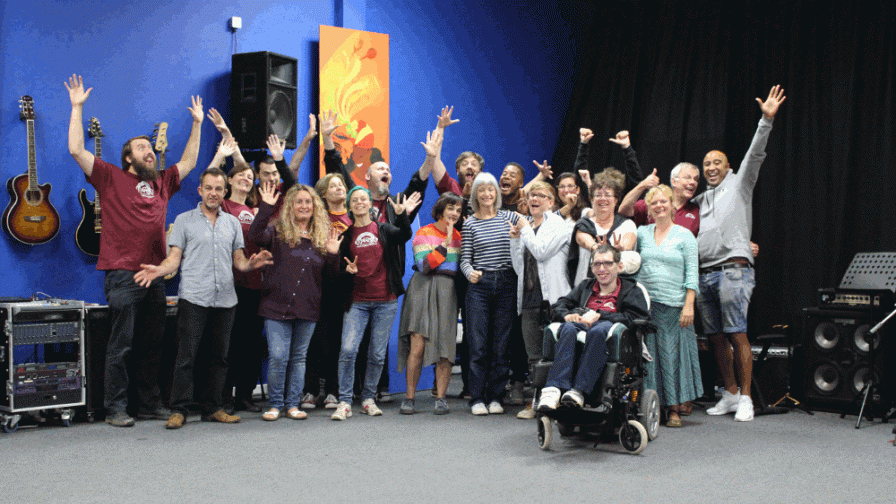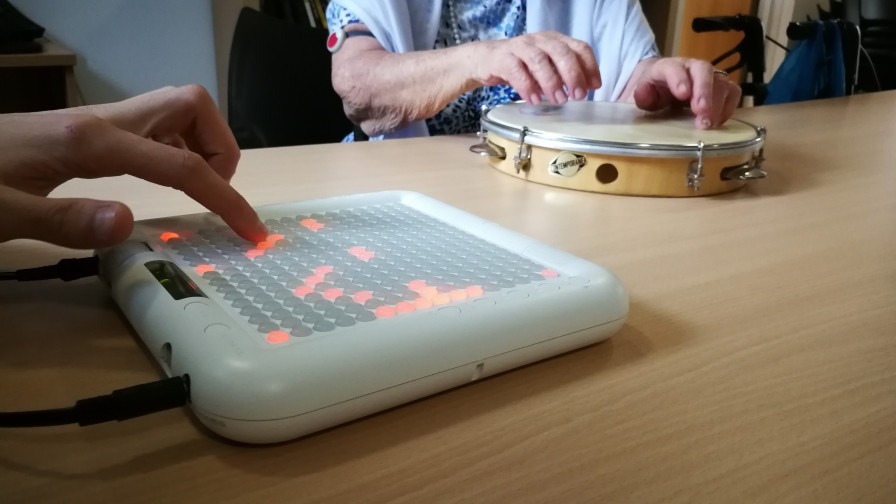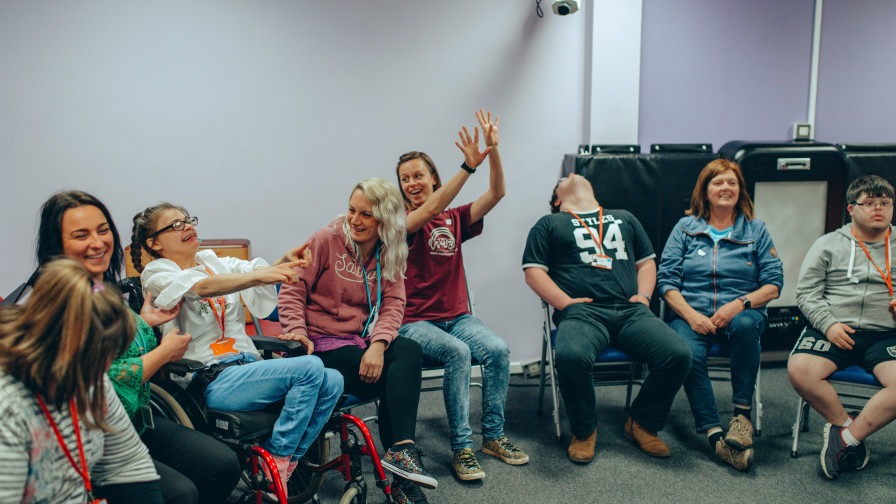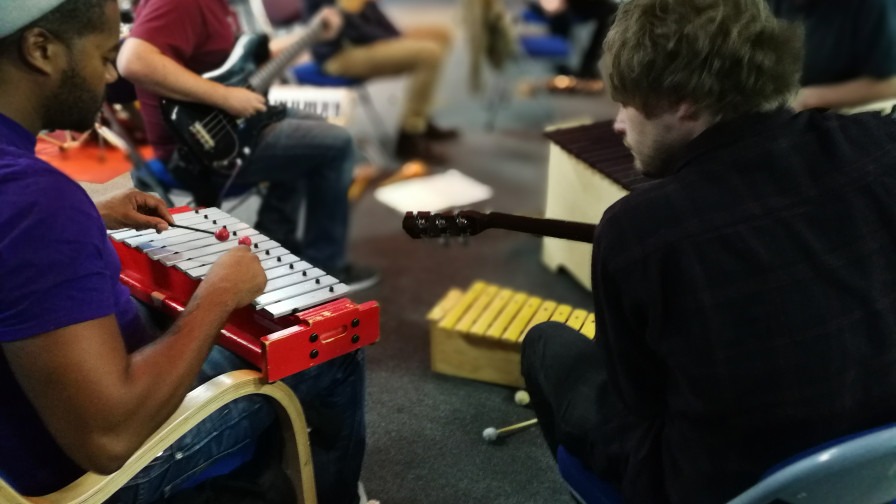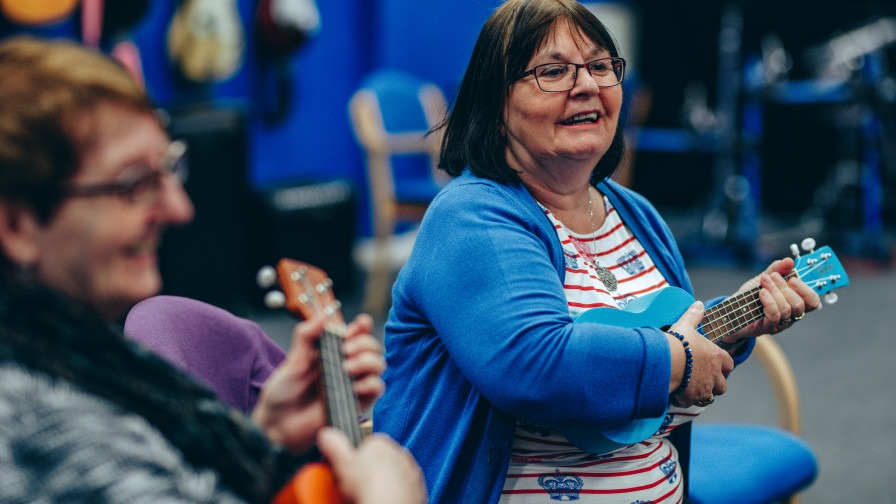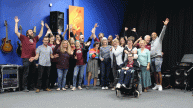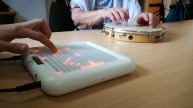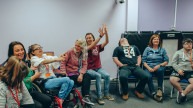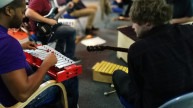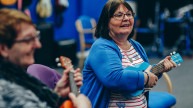Playfulness and Music

We don’t stop playing because we grow old; we grow old because we stop playing.
George Bernard Shaw
When’s a good time to ‘let go’?
In the words of Morecambe and Wise….
Bring me sunshine in your smile….bring me laughter all the while…in this world where we live there should be more happiness….
There’s always plenty to be worrying about and lots of boundaries to keep and things to achieve, however, we all need some respite from the pressures of the world around us and to remember how to be playful. If we can’t do this for ourselves as music leaders and educators, how can we convince our participants to do the same? When working under pressure or complex circumstances, as well as meeting expected project outcomes this can be a real challenge, but not impossible.
I was chatting to Plymouth Music Zone’s Admin and Finance Manager, Glyn Fuge about playfulness and her thoughts on this and she said, “When did we stop skipping? And why??? The focus on outcomes, whilst understandable, still needs to be balanced and we need to keep in mind that fun and enjoyment are still at the forefront of our work.”
I often worry about how much of ‘myself’ to bring to music sessions – balancing my energy and adjusting to the ebb and flow of emotional landscapes in the space. It’s not always appropriate to be bringing high energy and playfulness to every situation, but it’s good to remember how and when to make room for this. We can learn so much when we give space for play in our work. Not everything needs to be led. As we all know, so much can be learned from letting go and observing what happens naturally from there.
Karl Meyer, Music Programme Manager at Plymouth Music Zone when I asked him about what playfulness meant to him said:
Believe it or not it is so very easy to lose ourselves and become distracted by the seriousness and responsibilities that setting up and delivering work like ours entails. But as with all things there must exist some balance. Why engage with music, why creativity, why ‘the arts’? What is the reason so many of us play, sing, create, perform, educate ourselves about and listen to music…Simple, we love music and music making because of the unadulterated joy that it brings. Fun is a fundamental need, a moment to moment sense of wonder. Yet it is so often the first need we overlook, the need we service last and provide for the least. Particularly as adults fun can often be an afterthought.
PMZ likes to remember and remind others that we can be childlike and not childish (honestly, children should be considered the experts when it comes to having fun). We can be playful and still create something of worth. We can surrender our seriousness and still maintain control. Throughout everything PMZ provides we aim for all of our experiences to be engaging, inclusive, educational and fun - with the emphasis very much always on fun.
Training
In my training role at Plymouth Music Zone, it’s been clear that promoting playfulness and fun in our own team training sessions is highly valued alongside the more serious themes. It helps with staff retention and motivation and gives an opportunity for us to practice what we preach. In a recent inspirational day of training with Patrick Bailey (Bournemouth Symphony Orchestra Associate for Cornwall), our music leaders embraced the opportunity to playfully explore the following themes: a range of starting points for composition; structures; themed work; leading and conducting styles; working in familiar and unfamiliar spaces – establishing your work area and being playful with what’s available; creativity – nurturing your musicianship as a facilitator; playful collaboration etc.
It was very important to everyone attending to experience being ‘led’ by a facilitator. Even the title of the training – ‘Legs, Bums and Strums’ was meant to be a play on the idea of fitness circuit training ‘Legs, Bums and Tums’ and a chance to flex our own musical muscles at the same time as reflecting on some serious themes as a team.
Intergenerational reflections
We have the privilege of working with both adults and children at PMZ and witnessing and working with different kinds of playfulness gives us so many opportunities to think about this…an interesting example has been with our bereavement support work with St Luke’s Hospice in Plymouth where some adult participants described feeling guilty about enjoying themselves at a point when they felt they should be in mourning, and how they overcame these feelings and chose to embrace the joy and positivity they discovered by making music together.
Remembering my work as a music leader on ‘Music for a Change’ (see my earlier post) with Plymouth Domestic Abuse Service, working in a refuge with women and children, some of the most striking moments when the women talked about hope and how they had, even if for the briefest of moments remembered how to be playful themselves.
The observations suggest that the sessions also helped participants to connect with a childlike state of happiness within a safe environment, which possibly they had not been allowed before. Whereas abusive relationships and environments are characterised by control, the MFC sessions gave permission for silliness and play, both to mothers and children. P.3 of ‘Music for a Change’ (2014) independent evaluation report by Prof. Jocey Quinn and Claudia Blandon, Plymouth University
The full report can be downloaded from: https://bit.ly/2vw0Afz
Music leader, Deborah Woollaston works with a hugely diverse range of groups and individuals using her vast palette of tools as a composer, technologist, multi-instrumentalist and mother:
Encouraging participants to play involves letting go of the fear of making mistakes. As a music leader, it is essential to create that environment where experimenting is safe, and by playing, trying, making mistakes, trying something that I might not know the outcome of is one way of achieving this. If I can get it wrong, it’s ok for participants too. Doing that within a role where you hold the space and display a level of expertise that lets the participants know they are in safe hands usually takes some time to develop, and is different with every group in every setting.
Adults are much less used to play - they are usually the ones checking for danger or limits or being rational. A quote from the song our adult carer’s group wrote about playfulness in their sessions seems appropriate to refer to: “We’re children again, so we can let go”. This was a lyric about having respite from their daily responsibilities.
Interacting with children using play in a session can remind us how to do the same. It gives us new ways of looking at instruments or approaches, which happens regularly even with older children and teenagers.
Our Intergenerational Co-ordinator, Rob Tilsley recently visited a young people’s sheltered accommodation facility in Plymouth with an 88-year old (young!) lady who is also one of our 'Music Advocates', helping to encourage others to get involved in music.
Delcie spent nearly an hour with ‘S’. They spent their time together playing on a piece of music technology called a Yamaha ‘Tenori-on’. The device is constructed as a grid with buttons which light up as they are triggered. There are many modes and ways of using it. The most common is where time progresses on the x axis and the y axis is assigned to a note value. Over the course of the hour they drew different shapes and took it in turns to input notes, it just looked like the most natural thing in the world. Verbal communication between the two of them was not easy, Delcie’s hearing isn’t very good and ‘S’ had a tendency to mumble. Not only that, but the words and phrases they used were so different and they had to decipher one another. Despite this, the gulf of over 60 years was effortlessly bridged through play, and creativity. This very uncommunicative young man waved goodbye to her with a smile, which meant the world to the pair of them. This small gesture represented a very deep connection they had made through an hour’s playfulness.
Elaine Copestake (Proprietor, ‘Breakthrough Too’ music, craft and literacy business, Plymouth) has been a long-term PMZ organisational partner and has recently moved from running the Music department in a mainstream secondary school to running her own business. I asked her also to comment on this based on her knowledge of working in these different settings and her experiences of our work and approaches.
As toddlers we learn through play, linking the logical and creative parts of the brain together. At school age learning becomes more structured and less about playfulness increasingly so as we age chronologically. 'Music education' is a well-known phrase amongst musicians and educators yet the term itself sits in tension. Music is about learning through playfulness and exploration whereas education is a structure in which learning occurs. The rigidness of the education system confines teachers and learners from straying too far outside of the pre-set boundaries, therefore limiting the creativity of those involved.
The beauty of organisations like Plymouth Music Zone is that they can work within larger parameters than those within an educational setting and the experiences that can be facilitated could be themed around exploration, playfulness and creativity in a way that educational settings could never consider.

